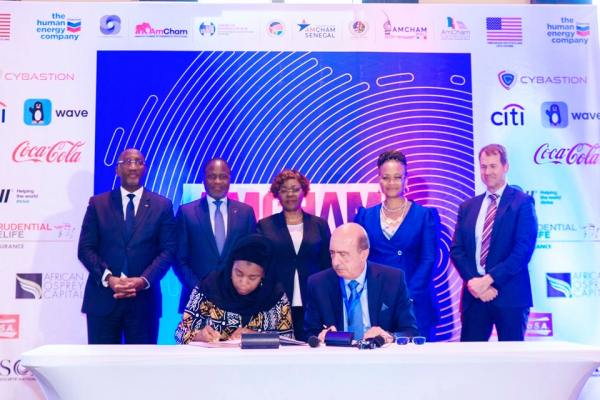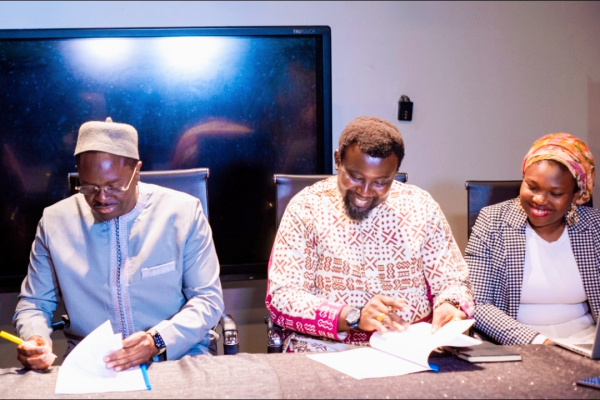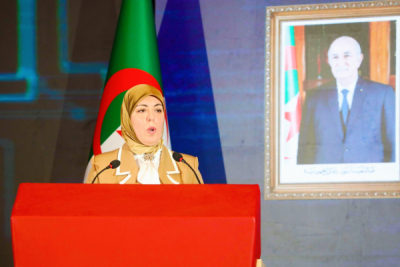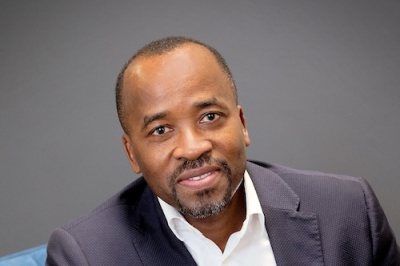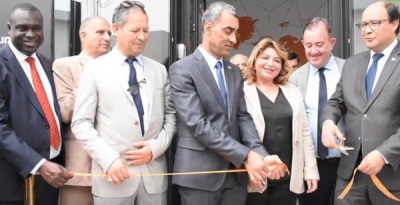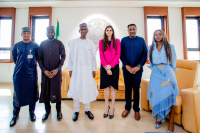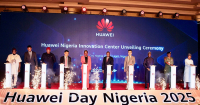
Tech (1147)
-
The U.S. announced over $550 million in trade agreements with Côte d’Ivoire, focusing on energy, digital transition, infrastructure, security, housing, and technology.
-
Key partnerships include George Mason University, Cybastion, and the Ivorian Ministry of Digital Economy to train youth in AI and cybersecurity, alongside Cybastion’s ongoing projects in West Africa.
-
These initiatives aim to strengthen Côte d’Ivoire’s digital sovereignty, secure critical infrastructures, and develop local digital talent.
The United States is deepening its engagement in Côte d’Ivoire's digital transformation, with a senior State Department official announcing and witnessing the signing of over $550 million in trade agreements during a recent visit to Abidjan. Troy Fitrell,acting Assistant Secretary for African Affairs , participated in key economic meetings where the deals spanned crucial sectors including energy, digital transition, infrastructure, security, housing, and technology.
A significant focus of the U.S. commitment lies in the information and communication technology (ICT) sector. Several initiatives were spotlighted, notably a memorandum of understanding between George Mason University, U.S. firm Cybastion, and the Ivorian Ministry of Digital Economy. This collaboration aims to cultivate young talent in artificial intelligence and cybersecurity, providing Ivorian youth with the skills necessary to navigate the demands of the digital economy.
Adding to this momentum, Cybastion, an American company, has pledged to develop projects across several West African nations, with a particular emphasis on cybersecurity, e-government solutions, connectivity enhancement, and technology-focused training programs.
This fresh wave of commitment builds upon existing cooperation between Côte d’Ivoire and Cybastion. In 2023, the cybersecurity firm inked an agreement with Ivorian authorities for the development of a national data center and a digital administrative city. Further bolstering digital skills, a partnership with Cisco was launched in 2024 to train 3,000 women in various digital competencies.
The overarching ambition of these initiatives is to foster a more robust regional digital ecosystem. For Côte d’Ivoire, the key challenge lies in effectively leveraging these partnerships to fortify its digital sovereignty, establish secure critical infrastructure, and cultivate a substantial pool of skilled individuals capable of meeting the expanding needs of the digital sector, moving beyond isolated pilot programs.
By Samira Njoya,
Editing by Sèna D. B. de Sodji
- The Senegalese Data Protection Commission (CDP) partnered with the Pan-African NGO Paradigm Initiative (PIN) to enhance digital education, privacy protection, and awareness in Africa.
- The collaboration will involve joint awareness campaigns, capacity-building workshops, and training for public institutions, private sector actors, and civil society.
- The partnership addresses challenges in Senegal's data protection culture and aligns with regional efforts to improve digital rights and security.
Senegal's Commission for the Protection of Personal Data (CDP) announced Monday a strategic memorandum of understanding with the Pan-African non-governmental organization Paradigm Initiative (PIN), on the sidelines of the African Network of Personal Data Protection Authorities (RAPDP) General Assembly in Abuja. The partnership aims to strengthen awareness, digital education, and privacy protection amid the continent's rapid digital transformation.
"The government, the private sector, civil society, and the media must collaborate so that we can make the most of the digital economy. We cannot continue to talk about the digital economy without protecting it," said Gbenga Sesan (photo, center), the executive director of the NGO.
The collaboration will involve joint awareness campaigns, including information drives, capacity-building workshops, and training sessions targeting public institutions, the private sector, and civil society. The overarching goal is to embed a culture of data protection at both the national and sub-regional levels.
PIN, which operates in six African nations – Cameroon, Nigeria, Kenya, Senegal, Zambia, and Zimbabwe – brings its expertise in advocating for digital rights to this partnership. The NGO also operates an online platform where individuals can report instances of abuse or unauthorized use of their personal data.
In Senegal, this collaboration coincides with the increasing digitization of public and private services, a trend supported by national policies aimed at leveraging digital technology for development. However, a robust data protection culture has yet to fully develop. While Law No. 2008-12 on personal data provides a legal framework, its full implementation is hindered by a lack of technical resources, training, and awareness within institutions and among the general public. Despite its active role, the CDP faces challenges in addressing all issues arising from the proliferation of digital platforms and the massive collection of data.
Across the African continent, the state of data protection is varied. According to the 2025 Yellow Card report, 39 of the 55 African countries now have personal data protection legislation in place. However, the enforcement of these laws differs significantly. While some nations, such as Morocco, South Africa, and Kenya, have active and well-structured regulatory authorities, others lack the necessary human and financial resources or independence, limiting their capacity to act effectively. Furthermore, the ratification of the Malabo Convention on cybersecurity and data protection, which entered into force in 2023, represents notable progress, although its implementation remains inconsistent.
Given these shared challenges, regional collaborations, such as the partnership between the Senegalese CDP and Paradigm Initiative, are seen as crucial for pooling resources, harmonizing practices, and fostering a digital environment that is safe, inclusive, and respectful of rights.
By Samira Njoya,
Editing by Sèna D. B. de Sodji
- The strategy aims to fully digitize Algeria by 2030, fostering collaboration among government, tech experts, and the private sector, with strong support from the presidency.
- Priorities include training 500,000 ICT specialists, reducing tech talent emigration by 40%, and boosting the digital sector’s GDP contribution to 20%.
High Commissioner for Digitalization Meriem Benmouloud unveiled Algeria's National Digital Transformation Strategy (SNTN) on Monday, a blueprint aiming to fully digitize the nation by 2030. The strategy seeks to galvanize all stakeholders – from government ministries and tech experts to public and private sector players – around a shared vision for the future.
Benmouloud emphasized the strong presidential backing for this initiative, stating, "The significant importance the President of the Republic places on digitization, personally monitoring its progress, underscores the unwavering political will at the highest levels to achieve a comprehensive digital transition in Algeria."
The SNTN is built upon five foundational pillars: the development of robust digital infrastructure, the cultivation of digital skills and training, the establishment of effective digital governance, the promotion of a thriving digital economy, and the inclusive integration of all citizens into the digital realm.
Central to the strategy is the development of human capital. The government aims to train 500,000 information and communication technology (ICT) specialists while simultaneously working to decrease the emigration of these skilled workers by 40%.
Economically, the SNTN envisions digitalization as a key engine of growth, targeting a 20% contribution from the digital sector to Algeria's gross domestic product. This will be achieved by digitizing public services and nurturing a dynamic environment for tech entrepreneurship.
Furthermore, a top priority is the complete digitization of government administration, a move expected to streamline processes, enhance transparency, and improve the quality of services delivered to both citizens and businesses.
Underpinning these ambitions are significant infrastructure projects, including two national data centers. The facility in Mohammadia is reportedly 80% complete, while the Blida center is 50% finished, according to the High Commissioner. These strategic assets are designed to bolster Algeria's national capacity for secure data storage, processing, and the hosting of digital platforms.
Supporting the entire strategy are two critical cross-cutting elements: first, the creation of a suitable legal and regulatory framework, with a draft law on digitization currently under development; and second, the strengthening of cybersecurity defenses, deemed essential for protecting data and information systems against increasingly sophisticated cyber threats.
Through the SNTN, Algeria envisions itself emerging as a leading digital hub in North Africa. Benmouloud asserted that the progress made to date positions the country to achieve continental leadership in digital transformation by the target year of 2030.
This strategic roadmap aims to provide a sustainable structure for government action in the digital sphere, with a clear focus on inclusive development, technological sovereignty, and the modernization of the Algerian economy.
By Samira Njoya,
Editing by Sèna D. B. de Sodji
AI fairness and inclusivity depend on diverse datasets. With Zindi crowdsourcing local data challenges and Cassava powering the infrastructure, the continent is poised to create context-aware AI tools.
Cassava Technologies, a pan-African technology provider, has signed a Memorandum of Understanding (MoU) with Zindi, a professional network for data scientists. The MoU, announced May 12, aims to accelerate the adoption of artificial intelligence (AI) and Graphics Procesing Unit (GPU)-as-a-Service (GPUaaS) solutions across Africa.
“For Africa’s AI ecosystem to grow and thrive, it’s essential to provide platforms and resources,” said Hardy Pemhiwa, President and Group CEO of Cassava Technologies. “Combining our data centres’ advanced GPU capabilities with Zindi’s innovative data science platform creates a powerful foundation for digital advancement.”
The partnership aims to empower African developers and startups with the tools and infrastructure needed to build scalable AI solutions. Through this collaboration, Zindi will leverage Cassava’s GPUaaS infrastructure to enhance its AI model development, while both organizations will explore opportunities to cross-integrate platforms and expand access to talent, data, and innovation.
Zindi, known for organizing AI challenges in partnership with companies, NGOs, and governments, sees the partnership as a catalyst for unlocking locally-relevant AI solutions.
“Zindi is thrilled at the opportunity to partner with Cassava Technologies to strengthen African datasets, address local problems with locally-developed solutions, and help more African AI builders access the resources they need to succeed,” said Celina Lee, CEO and Co-Founder of Zindi.
As digital transformation accelerates across Sub-Saharan Africa, artificial intelligence is emerging as a key driver of economic opportunity. The United Nations projects that AI could contribute up to $1.5 trillion to the region’s economy by 2030, a figure that underscores the urgency of building the infrastructure, talent pipelines, and innovation ecosystems needed to capture this potential.
The Cassava–Zindi partnership is a timely response to this opportunity. By combining Cassava’s GPU-as-a-Service capabilities with Zindi’s pan-African network of data scientists, the collaboration directly supports scalable, locally driven AI development, a critical step toward unlocking the region’s projected AI-driven growth.
This announcement follows Cassava’s 2024 launch of its AI business and its bold plans to build Africa’s first AI factory. The Zindi partnership supports Cassava’s broader vision of fostering responsible AI innovation and digital transformation across the continent.
Hikmatu Bilali
- Orange Tunisia inaugurated a TIER III data center in Kalâa Kebira, Sousse, to enhance local data hosting and support the country's digital transition.
- Covering 1,000 m², the center offers cloud hosting, backup, disaster recovery, and connectivity, designed entirely from scratch with Tunisian expertise.
Orange Tunisia last week unveiled a new, advanced data center in Kalâa Kebira, Sousse governorate, local media reported. The TIER III certified facility aligns with the operator's strategy to bolster Tunisia's digital transformation by increasing domestic data hosting capabilities.
The 1,000 square meter data center is built to international standards for security, energy redundancy, and service continuity. It will offer cloud hosting, backup, disaster recovery, and connectivity services, catering to both Orange Tunisia's internal operations and businesses seeking secure outsourcing for their information systems management.
"We are particularly proud of this data center for several reasons. Firstly, it was designed and built entirely from the ground up. This isn't a renovation or adaptation of an existing site, but a completely new project conceived from the start to meet the most stringent standards," stated Thierry Millet, CEO of Orange Tunisia. The company holds a 26.5% share of Tunisia's mobile telephony market as of January 2025, according to the National Telecommunications Authority.
This development occurs amidst an accelerating digital transformation within Tunisia. Orange Tunisia aims to support this momentum and contribute to enhanced digital sovereignty. "Our pride lies in having executed this impressive TIER III data center with 100% Tunisian talent, utilizing Tunisian companies for design, control, and implementation," said Adel Akrout, the company's network and services director.
With the demand for digital services rapidly increasing, this initiative could position Tunisia as a key regional data hub. It also sets the stage for future sovereign cloud endeavors and strengthens the role of operators in the country's digital advancement.
Adoni Conrad Quenum
- Bolt ends services in Tunisia on May 9, following government actions related to money laundering, tax fraud, and illegal operations.
- Shutdown impacts over 5,000 independent drivers, sparking debate on Tunisia's legal framework for digital platforms amid high unemployment.
Estonian ride-hailing application Bolt ceased operations in Tunisia on Friday, May 9, with a complete deactivation of the app confirmed on local devices. Since that date, the application is inaccessible, displaying the message "Bolt is not yet available here" to Tunisian users.
This shutdown follows nearly six weeks after the government's decision on March 24 to suspend several transport platforms, including Bolt, amid suspicions of money laundering, tax evasion, and illegal operation. Despite the announced suspension, the application had remained partially active, creating legal ambiguity regarding its status. This deactivation marks the effective end of Bolt's activity in the country, although the company has not yet publicly stated the specific reasons for its withdrawal.
Tunisian authorities had previously initiated stringent measures against platforms operating without legal authorization. In Bolt's case, the company was removed from the national business register, its offices were closed, and assets estimated at 12 million Tunisian dinars (approximately $3.9 million) were seized. Bolt, for its part, had denied the accusations, asserting its compliance with Tunisian law while criticizing a process conducted without due legal recourse.
Bolt, which entered Tunisia in 2019, had rapidly become a significant player in urban transportation, particularly in Tunis, Sfax, and Sousse. The application provided income for over 5,000 drivers, many of whom were independent contractors, in a challenging socio-economic environment. Its suspension heightens uncertainty for these workers, especially given that the national unemployment rate had already reached 16% in the third quarter of 2024, according to the National Institute of Statistics.
Bolt's departure has reignited discussions about the legal framework for digital platforms in Tunisia. The absence of clear regulations leaves companies operating in a precarious gray area, susceptible to administrative actions and regulatory shifts. To fully leverage the digital economy and attract foreign investment, Tunisia will need to strike a balance between regulatory oversight and economic appeal.
By Samira Njoya,
Editing by Sèna D. B. de Sodji
Aligning with global tech leaders can position Nigeria to attract more foreign direct investment (FDI), encourage local innovation, and integrate more deeply into the global digital economy.
Nigeria and Google are continuing their discussions to make the country a hub for digital innovation in Africa. During a two-day workshop held on May 6th and 7th, 2025, they explored refining a draft implementation framework. The partnership stems from a meeting between President Bola Ahmed Tinubu and Google CEO Sundar Pichai in Paris in February 2025
The National Information Technology Development Agency (NITDA), acting under presidential directive, is coordinating the project with Google, identifying practical use cases and stakeholder needs across sectors. During the workshop, Google showcased successful global digital interventions to demonstrate how targeted investment in technology can improve economic resilience, institutional efficiency, and social inclusion.
Structured around five core pillars, the collaboration focuses on building scalable digital infrastructure, empowering the workforce with digital skills, driving AI innovation and research, promoting cloud adoption for digital government, and strengthening investment frameworks for sustainable growth.
The collaboration builds on Google's earlier commitment of ₦2.8 billion (approximately $3.6 million), announced in October 2024, to support Nigeria’s digital economy—an investment aligned with the Federal Government’s Strategic Blueprint for Digital Transformation.
The partnership marks a pivotal step in fast-tracking digital transformation, economic growth, and job creation within Africa’s largest economy. With the World Economic Forum projecting that AI and automation will generate 97 million new jobs globally by 2025, equipping Nigerians with AI and digital skills is critical, not only to bridge the digital divide but also to future-proof the workforce and ensure inclusive participation in the digital economy.
Hikmatu Bilali
The Innovation Center aligns with Nigeria’s digital strategy and the federal government’s Renewed Hope Agenda, reinforcing Huawei’s role in building an intelligent, inclusive future for the country.
Huawei has launched an Innovation Center in Lagos as part of the inaugural Huawei Day Nigeria 2025, a three-day event held May 6-8, which marks 25 years of Huawei’s presence in Nigeria.
The Centre is intended to function as a collaborative hub where customers, partners, and ICT professionals can engage with emerging technologies and co-create innovative solutions across key sectors, including education, energy, finance, governance, and oil & gas. It underscores Huawei’s commitment to advancing local technology and co-innovation.
Speaking at the launch, Huawei Nigeria CEO Chris Lu highlighted the company’s longstanding partnership with Nigeria, stating, “This Innovation Center marks the start of our next chapter—ushering in an AI-driven era with local cloud and green energy solutions.”
Minister of Communications and Digital Economy Dr. Tijani praised the center as a platform for co-creating technologies that address local needs, helping Nigeria transition from tech consumer to creator.
The Information and Communication Technology (ICT) sector has become a significant contributor to Nigeria's economy. According to the National Bureau of Statistics (NBS), the digital economy contributed 13.12% to Nigeria’s GDP in Q1 2024, underscoring the sector's potential to drive economic growth. Huawei's Innovation Center is poised to play a crucial role in this growth by fostering technological innovation and supporting the digital ecosystem.
Hikmatu Bilali
- Orange Mobile Finance Sierra Leone (OMFSL) introduced a digital microcredit service for Orange Money users, providing instant loans via mobile shortcodes.
- The service targets small merchants and agents, offering quick access to working capital without traditional loan complexities, as part of Orange's strategy to expand financial inclusion in West Africa.
Orange Mobile Finance Sierra Leone (OMFSL) introduced "Kwik Moni Loan" on Thursday, May 8, a digital microcredit service targeting agents and merchants who utilize Orange Money. The new financial product offers users immediate loan access through their Orange Money mobile wallets by dialing the shortcodes #145# for agents and #146# for merchants.
David Mansaray, CEO of OMFSL, stated that the 24/7 service provides swift and convenient access to working capital for a range of professionals, including shopkeepers, taxi drivers, and store owners. The initiative seeks to facilitate business growth without the complexities of traditional loan processes.
The launch of "Kwik Moni Loan" aligns with Orange's wider strategy to enhance financial inclusion in West Africa. In 2020, Orange previously launched "Orange Money Lajor" in Sierra Leone, a microcredit service for Orange Money customers in collaboration with Empire Solution. Additionally, Orange Bank Africa, the group's digital banking arm, was established in Côte d'Ivoire in 2020 to provide savings and credit services accessible via mobile, with plans for regional expansion.
Through this latest initiative, Orange Mobile Finance Sierra Leone aims to bolster financial inclusion by enabling quick credit access for small merchants and local agents. By offering solutions tailored to their specific needs, the service intends to support entrepreneurship, improve the financial stability of unbanked populations, and stimulate commercial activity nationwide.
By Samira Njoya,
Editing by Sèna D. B. de Sodji
- Google will implement an 18% VAT on all digital services in Senegal starting June 1, 2025, following the country's new digital tax regime introduced in July 2024.
- Professional clients must provide local tax information (NINEA or commercial register number) for compliant invoicing.
Starting June 1, 2025, Google will levy an 18% value-added tax (VAT) on all its digital services for users based in Senegal, signaling a significant step in the Senegalese government's push for digital taxation.
The U.S. tech giant will now require its business clients in Senegal to provide their local tax identification details, specifically the national identification number for businesses and associations (NINEA) or the commercial register number. This information will be used to generate invoices compliant with Senegal's General Tax Code. The VAT will apply across Google's digital service portfolio, including Google Ads, Google Cloud, software subscriptions, and streaming platforms.
This move follows the implementation in July 2024 of a new tax framework that mandates VAT on digital services provided by foreign companies without a physical presence in Senegal. To date, few multinational digital firms have officially complied. Google's adherence to this regulation positions it as one of the first major industry players to do so, potentially setting a precedent for others that have yet to follow suit.
According to Senegal's Directorate General of Taxes and Domains (DGID), the digital VAT has already generated over 1 billion FCFA (approximately $1.7 million) in its initial year. The government's medium-term objective is to increase these revenues to 10 billion FCFA as part of its broader strategy to modernize its tax system and broaden the digital tax base.
Google's compliance, as a global leader in digital services, is therefore considered a pivotal development for the success of this tax reform. It is anticipated to not only increase tax revenues for Senegal but also to foster greater parity between local businesses and multinational corporations operating online.
By Samira Njoya,
Editing by Sèna D. B. de Sodji
More...
- Morocco has allocated $3.6 million to modernize 45 wholesale fisheries markets, enhancing transaction transparency and product traceability.
- Part of the Halieutis strategy, the project supports sustainable fisheries, food security, and economic growth, with the sector contributing 2.3% of GDP and generating over 700,000 jobs.
Morocco has invested 34 million dirhams (approximately $3.6 million) to digitize auctions in 45 wholesale markets as part of its efforts to modernize the fisheries sector. This initiative, spearheaded by the State Secretariat in charge of Maritime Fisheries, aims to boost transaction transparency, improve product traceability, and optimize distribution across the national market.
State Secretary Zakia Driouich announced the plan on Tuesday, May 6, before the Chamber of Advisors, specifying that the digitization encompasses all documents used within these facilities. This move will enable better tracking of seafood product flows and help to curb informal practices that persist in some marketing channels.
This investment aligns with the Halieutis strategy, launched in 2009, which seeks to establish Morocco as a competitive and sustainable fisheries hub. Beyond its contribution to food security, the sector accounts for about 2.3% of the national GDP, providing 220,000 direct jobs and over 500,000 indirect jobs. In 2024, national production reached 1.42 million tons, valued at 16.3 billion dirhams, solidifying the kingdom's position as a leading global exporter of processed and frozen seafood products.
More than just digitizing paperwork, this initiative sets the stage for a broader transformation of the sector. By automating sales processes, the government hopes to not only enhance the operational efficiency of wholesale markets but also to create a foundation for interconnecting various stages of the value chain, from catch to final distribution. Over the long term, this approach could facilitate the integration of new technologies, such as real-time traceability systems, logistics management platforms, and tools for monitoring prices and traded volumes.
To date, 45 of the 70 existing wholesale markets have been included in this operation. The project is ongoing, suggesting further investment phases to extend digitization across the country, particularly in landing sites and fishing villages.
By Samira Njoya,
Editing by Sèna D. B. de Sodji
- Doumba is a seasoned digital entrepreneur and strategist, founder of ClikAfrik and ClikPay, with a strong background in financial inclusion and digital transformation.
- He will lead key projects including fiber optic expansion, data center construction, and development of Libreville’s tech hub, supporting Gabon’s emergence as a regional innovation leader.
Two days after his inauguration as the fourth President of the Gabonese Republic, Brice Clotaire Oligui Nguéma on Tuesday unveiled the first government of his seven-year term. A key appointment was Mark Alexandre Doumba as Minister of Digital Economy, Digitalization, and Innovation. He succeeds Brigadier General Bonjean Rodrigue Mbanza, who held the same portfolio in the preceding transitional government.
Prior to this appointment, Mark Alexandre Doumba briefly served as Minister of Economy and Participations. His reassignment to head this strategic ministry underscores the authorities' intent to bolster the nation's modernization through innovation and technology.
Mark Alexandre Doumba, 38, is recognized as an experienced entrepreneur and a digital finance strategist. As the founder of the ClikAfrik group and the neobank ClikPay, he has made financial inclusion through digital technology a central focus of his work. Notably, he contributed to the establishment of the Digital Investment Window, a platform that facilitated the formalization of tens of thousands of Gabonese micro and small businesses. He holds degrees from George Washington University, the London School of Economics, and the Harvard Kennedy School.
The new minister assumes a substantial portfolio with several priority initiatives, including the revitalization of the national fiber optic backbone, the construction of sovereign data centers, and the modernization of public services through digital technology. These projects are among the key priorities outlined in the transitional president's roadmap.
Mark Alexandre Doumba will also be tasked with revitalizing the Gabonese Innovation Center and bringing to fruition the digital and industrial technopole project, which aims to establish Libreville as a significant regional hub for innovation. His pragmatic approach and expertise in digital transformation and strategic partnerships position him to play a crucial role in Gabon's emergence as a major innovation player in Central Africa.
Samira Njoya
- Cape Verde launched a technology park aimed at becoming a regional tech hub
- The park offers international-standard infrastructure and tax incentives
- It supports economic diversification and youth employment
Cape Verde officially inaugurated TechPark CV on Monday, a regional technology center designed to boost innovation and digital transformation both within the island nation and beyond its borders.
The project, backed by a 45.59 million euro ($51.7 million) investment from the African Development Bank (AfDB), is a key strategic move for Cape Verde as it aims to establish itself as a technology hub in West Africa.
"TechPark CV offers a welcoming space where innovators from diverse backgrounds and cultures can collaborate and flourish together," stated Carlos Monteiro, President of TechPark CV. "Through this initiative, we are not simply constructing a digital center; we are cultivating a community where technology fuels economic growth and sustainable development for Cape Verde and our international partners."
The technology park aligns with the nation's broader economic diversification strategy and is a component of Cape Verde’s 2030 digital economy development plan. The investment represents nearly 2% of the country’s gross domestic product, underscoring the significant emphasis placed on digital technology within its growth model.
International-Standard Infrastructure
The technology park features data centers, co-working spaces, a training facility, a business center, and a conference center, all interconnected by high-speed infrastructure. Its designation as a Special Economic Zone for Technologies (ZEET) provides appealing tax benefits, including VAT exemption, reduced import duties, and a lowered corporate tax rate of 2.5%.
Operating across two campuses located in Praia on Santiago Island and Mindelo on São Vicente Island, TechPark CV already houses 23 companies and has the capacity for up to 1,500 professionals. It aspires to become a focal point for innovation, training, and experimentation, while also attracting foreign investment.
Beyond attracting domestic and international businesses, TechPark CV aims to be a catalyst for the development of crucial technology sectors such as artificial intelligence, blockchain, fintech, big data, and the Internet of Things (IoT). Cape Verde also intends to strengthen its regional cooperation through a partnership with the Economic Community of West African States (ECOWAS) to contribute to the expansion of digital innovation in West Africa.
The project prioritizes the integration of local talent. It fosters partnerships with academic institutions and seeks to create job opportunities for Cape Verdean youth, thereby contributing to the development of human capital and the strengthening of the national economy.
Samira Njoya
- India pledged digital infrastructure support to Angola, including cooperation in e-governance, space, and healthcare
- $200M defense credit line and will help implementdigital public infrastructure model, enabling digital IDs, e-payments, and social registries in Angola.
India has pledged to share its expertise in digital public infrastructure with Angola. The announcement came after a meeting in New Delhi on Friday, May 3, between visiting Angolan President João Lourenço (photo, left) and Indian Prime Minister Narendra Modi (photo, right). The initiative aims to enhance e-governance and streamline citizen access to public services in Angola.
According to a joint statement, India has "approved a $200 million credit line for Angola's defense and will collaborate in the areas of digital public infrastructure, space, and healthcare." The partnership seeks to introduce Angola to India's model of digital public infrastructure (DPI), an interoperable system that digitizes administrative services, promotes financial inclusion, and connects citizens with essential services.
This collaboration could enable Angola to implement digital identification systems, electronic payment platforms, and unified social registries. It also includes provisions for cooperation in the space sector and training in digital skills.
The announcement underscores a growing strategic alignment between the two nations, which are marking 40 years of diplomatic ties this year. It also reflects India's ambition to expand its technological influence across the African continent. India has already deployed similar systems in Africa, notably through its Modular Open Source Identity Platform (MOSIP), which countries like Morocco, Sierra Leone, Guinea, and Ethiopia have adopted or are in the process of implementing. Furthermore, India is collaborating with several African nations to develop digital payment systems inspired by its Unified Payments Interface (UPI), with advanced discussions underway, particularly with Rwanda.
Ultimately, this partnership has the potential to accelerate the modernization of Angolan government services, improve administrative efficiency, and stimulate local innovation. It represents strategic support for Angola as it strives to improve its standing in international digital governance rankings. According to the United Nations, Angola currently ranks 156th out of 193 in the 2024 e-Government Development Index, with a score of 0.4149, falling below both the African average (0.4247) and the global average (0.6382).
By Samira Njoya,
Editing by Sèna D. B. de Sodji


